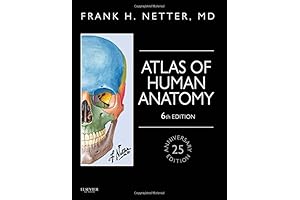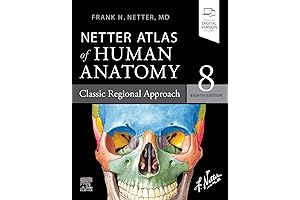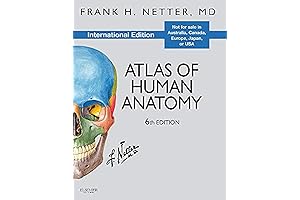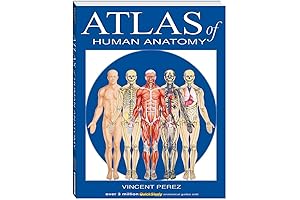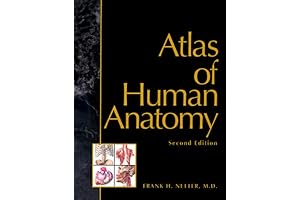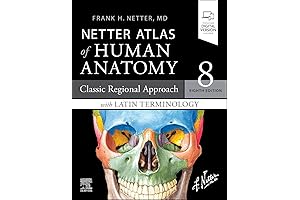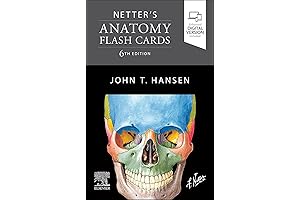· atlas of human anatomy · 12 min read
Best Atlas of Human Anatomy: Nailing the Exam in 2024
Explore the best Atlas of Human Anatomy, meticulously reviewed and curated for 2024. Dive into a wealth of options to enhance your anatomy knowledge and ace the exam.
The human body is an intricate masterpiece, and understanding its anatomy is essential for medical professionals and students alike. With so many Atlas of Human Anatomy on the market, finding the right one can be overwhelming. To help you make an informed decision, we've carefully reviewed and selected the best options available in 2024. Prepare to excel in your studies and examinations with our expert recommendations!
Overview

PROS
- Meticulously detailed illustrations showcase intricate anatomical structures with unmatched clarity.
- Student Consult platform provides invaluable interactive resources, enhancing learning experiences.
CONS
- Some users may find the digital resources less intuitive compared to physical materials.
The Atlas of Human Anatomy, 6th Edition, emerges as an indispensable resource for medical students and professionals seeking a comprehensive understanding of human anatomy. It seamlessly blends traditional anatomical illustrations with groundbreaking digital enhancements, providing an unparalleled learning experience.
The centerpiece of this atlas lies in its stunningly detailed illustrations, a hallmark of Netter's renowned artistic legacy. Each intricate structure is meticulously depicted, offering exceptional clarity and depth. These visual masterpieces serve as an invaluable tool for visualizing and understanding the complexities of the human body.
Beyond the stunning visuals, the Atlas of Human Anatomy harnesses the power of technology to elevate learning. Through the Student Consult platform, users gain access to a wealth of interactive ancillaries, including quizzes, videos, and self-assessment tools. These resources promote active engagement and reinforce concepts, fostering a deeper understanding of the subject matter. Furthermore, a concise text complements the illustrations, providing essential anatomical information in a clear and accessible manner.

PROS
- Meticulously detailed illustrations by Frank H. Netter, renowned medical illustrator
- Comprehensive coverage of human anatomy, from microanatomy to clinical perspectives
CONS
- Pricey compared to other anatomy atlases
- Large file size for the downloadable image bank
Embark on an unparalleled anatomical journey with the Atlas of Human Anatomy, Professional Edition. This masterpiece by Frank H. Netter, the iconic medical illustrator, offers a breathtaking visual encyclopedia of human anatomy. From delicate microstructures to intricate organ systems, every aspect is meticulously captured with precision and artistry.
The 6th edition of this esteemed atlas seamlessly blends traditional and cutting-edge technologies. It grants access to NetterReference.com, a comprehensive digital resource that houses the complete atlas content and an extensive image bank, empowering you with instant access to anatomical knowledge on all your devices. Whether you're a seasoned clinician, a student eager for anatomical mastery, or an artist seeking inspiration, this atlas is an indispensable tool. Its exceptional illustrations and comprehensive content make it a beacon of anatomical understanding.

PROS
- Acllaimed by medical students, professors, and healthcare professionals.
- Over 800 beautifully colored images help students to master their knowledge of human anatomy.
CONS
- Black and white images present in some newer textbooks are not included in this edition.
Dr. Netter’s Atlas of Human Anatomy has been the go-to text for medical students and students in other health programs for over 25 years. This 6th edition offers more than 800 images and illustrations, combined with concise text and informative legends, to provide students with a clear understanding of human anatomy from both regional and systemic perspectives. Clinically-relevant information and frequent self-assessments support student understanding of the material.
As with all things in life, the Netter Atlas of Human Anatomy continues to develop and progress to meet the needs of today’s students and professionals. Consequently, the 6th edition of this respected book is a bit of a departure from earlier versions both in presentation and content. For example, while images in past editions were traditionally black and white with color highlights, the images in this edition are all in full color. This overall revision and cutting-edge art will enable students to master their knowledge of human anatomy with a view that is both visual and easy to understand.

PROS
- Provides a comprehensive overview of human anatomy with high-quality images.
- Features clinical correlations and case studies for practical application of anatomical knowledge.
CONS
- May not be suitable for beginners due to its advanced content.
- Some users have reported occasional errors or inaccuracies in the text.
The Atlas of Human Anatomy, 6th Edition, stands as a cornerstone in the field of anatomical reference. This comprehensive atlas offers an unparalleled exploration of human anatomy through its exquisite imagery and detailed descriptions. Not only does it cater to students, but it also serves as an invaluable resource for healthcare professionals seeking to enhance their anatomical understanding.
One of the key strengths of this atlas lies in its extensive collection of high-quality images. These images, meticulously captured using advanced imaging techniques, provide a clear and precise representation of anatomical structures. Moreover, the atlas incorporates clinical correlations and case studies, effectively bridging the gap between theoretical knowledge and its practical application in clinical settings. This feature is particularly beneficial for medical students and practicing physicians seeking to refine their diagnostic and treatment skills.

PROS
- Comprehensive coverage of human anatomy
- Detailed illustrations and clear, concise explanations
- Updated content based on the latest research and advances in medical imaging
CONS
- Expensive
- Can be overwhelming for beginners
The Atlas of Human Anatomy, 6th Edition, is the ultimate reference guide for students and medical professionals alike. With over 1,200 full-color illustrations and clear, concise text, this atlas provides a comprehensive overview of the human body. The 6th edition has been updated to include the latest research and advances in medical imaging, making it the most current and accurate anatomy atlas available.
Whether you are a student studying the human body for the first time or a medical professional looking to brush up on your anatomy knowledge, the Atlas of Human Anatomy, 6th Edition, is the perfect resource.

PROS
- Exquisitely detailed and comprehensive anatomical illustrations
- Accompanying concise and informative text enhancing理解
- QuickStudy format for convenient and rapid reference
CONS
- Some users prefer more in-depth explanations
- May not be suitable for advanced medical students
Embark on a visual journey into the realm of human anatomy with the Atlas of Human Anatomy, 6th Edition. This meticulously crafted guide presents an unrivaled collection of photographic illustrations, capturing the intricate details of the human body with unmatched precision. Each image is meticulously annotated, providing concise and informative text that enhances your understanding of anatomical structures and their relationships.
The Atlas of Human Anatomy is designed with both students and professionals in mind. Its QuickStudy format allows for quick and easy reference, making it an invaluable resource for studying, exam preparation, and clinical practice. Whether you're a medical student seeking to solidify your anatomical knowledge or a healthcare professional seeking a reliable reference, this atlas will exceed your expectations.

PROS
- Comprehensive and in-depth coverage of human anatomy
- Exceptional illustrations and precise descriptions of anatomical structures
CONS
- May be overwhelming for beginners
- Expensive compared to other anatomy atlases
The Atlas of Human Anatomy, 6th Edition is the definitive reference guide for medical students, healthcare professionals, and anyone fascinated by the human body. With over 1,200 full-color illustrations and detailed descriptions, this atlas provides an unparalleled look into the intricate workings of the human body.
The book's organization is logical and user-friendly, making it easy to navigate and find the information you need quickly. Each chapter focuses on a different region of the body, from the skeletal system to the nervous system. The illustrations are meticulously drawn and labeled, providing a clear and accurate representation of anatomical structures. The text is concise and informative, providing essential information without overwhelming the reader with unnecessary details.

PROS
- Unparalleled visual aids to enhance anatomical understanding
- Comprehensive coverage ensures a deep dive into the human body
CONS
- Some minor inaccuracies have been reported
- Slightly outdated compared to recent advancements in the field
Prepare to embark on an unparalleled anatomical journey with the Atlas of Human Anatomy, Sixth Edition. This masterpiece showcases an exquisite collection of visual aids, each meticulously crafted to illuminate the intricacies of the human body. Immerse yourself in a comprehensive exploration of its structures, from the smallest cells to the grandest systems.
This atlas is not without its shortcomings. Some minor inaccuracies have been noted, and certain aspects may not reflect the most recent advancements in the field. However, these imperfections do little to diminish the overall value and immense contribution of this remarkable work.

PROS
- Exceptional visuals with thousands of clear and detailed illustrations by famed medical illustrator Frank H. Netter
- Comprehensive coverage of all body systems and regions
- Includes Latin terminology throughout, essential for medical students and professionals
CONS
- Limited online access compared to some competitors
- High cost may not be accessible to all
The Netter Atlas of Human Anatomy, 6th Edition: Latin Terminology is an invaluable resource for students and professionals in the medical field. With its exquisite illustrations and thorough explanations, this atlas provides a comprehensive guide to human anatomy, particularly excelling in its focus on Latin terminology. The inclusion of Latin terms alongside English equivalents enhances its usefulness for medical students and practitioners. The atlas covers all body systems and regions in great detail, making it an ideal companion for studying and reviewing anatomy.
The illustrations by Frank H. Netter are a true highlight of this atlas. His unique style combines accuracy with clarity, allowing readers to visualize anatomical structures with remarkable ease. The addition of Latin terminology adds depth to the explanations and reinforces the understanding of medical terminology. While the online access is somewhat limited, the wealth of information and the exceptional illustrations more than compensate for this minor drawback. The only notable downside is its cost, which may be prohibitive for some individuals. Overall, the Netter Atlas of Human Anatomy, 6th Edition: Latin Terminology is an exceptional resource that sets the standard for anatomical reference and enhances the understanding of human anatomy through the integration of Latin terminology.

PROS
- Master key anatomical concepts with 325 brightly illustrated cards
- Test your understanding with comprehensive clinical rotations
CONS
- May not be suitable for advanced medical students
- Lacks interactive elements found in online or multimedia resources
Netter's Anatomy Flash Cards are a valuable resource for reinforcing your anatomical knowledge. These 200 cards feature stunning illustrations from Netter, enhancing your visual memory and making learning more engaging. The clinical rotations complement each card, mimicking real-world practice and boosting your exam readiness.
Whether you're a medical student seeking reinforcement or a seasoned practitioner hoping to refresh your understanding, Netter's Anatomy Flash Cards are an effective tool. Their succinct format allows for quick study sessions, maximizing your productivity. However, they may not offer advanced anatomy students enough depth, and lack interactive elements that some online or multimedia resources provide.
From classic texts to comprehensive digital resources, we've got you covered. Our top picks include Netter's Atlas of Human Anatomy, renowned for its stunning illustrations and clear explanations. For a more interactive experience, consider the Atlas of Human Anatomy: Including Student Consult Interactive Ancillaries and Guides, providing access to online quizzes and videos. And for those seeking a concise guide, the Atlas Of Human Anatomy (Quickstudy Books) offers quick reference and portability. Whichever option you choose, you'll be well-equipped to master human anatomy and achieve academic success.
Frequently Asked Questions
What is the best Atlas of Human Anatomy for medical students?
Our top recommendation is Netter's Atlas of Human Anatomy, valued for its exceptional illustrations and comprehensive explanations.
Is there an Atlas of Human Anatomy that includes interactive online resources?
Yes, the Atlas of Human Anatomy: Including Student Consult Interactive Ancillaries and Guides offers a wealth of online quizzes and videos to enhance your learning experience.
What is considered the classic Atlas of Human Anatomy?
The Netter Atlas of Human Anatomy: Classic Regional Approach remains a highly respected and widely used classic text in the field.
Are there any concise and portable Atlases of Human Anatomy available?
For quick reference and portability, we recommend the Atlas Of Human Anatomy (Quickstudy Books), providing essential information in a convenient format.
What other resources can complement an Atlas of Human Anatomy?
Netter's Anatomy Flash Cards (Netter Basic Science) offer a valuable companion to your Atlas, providing visual reinforcement of key anatomical structures.

